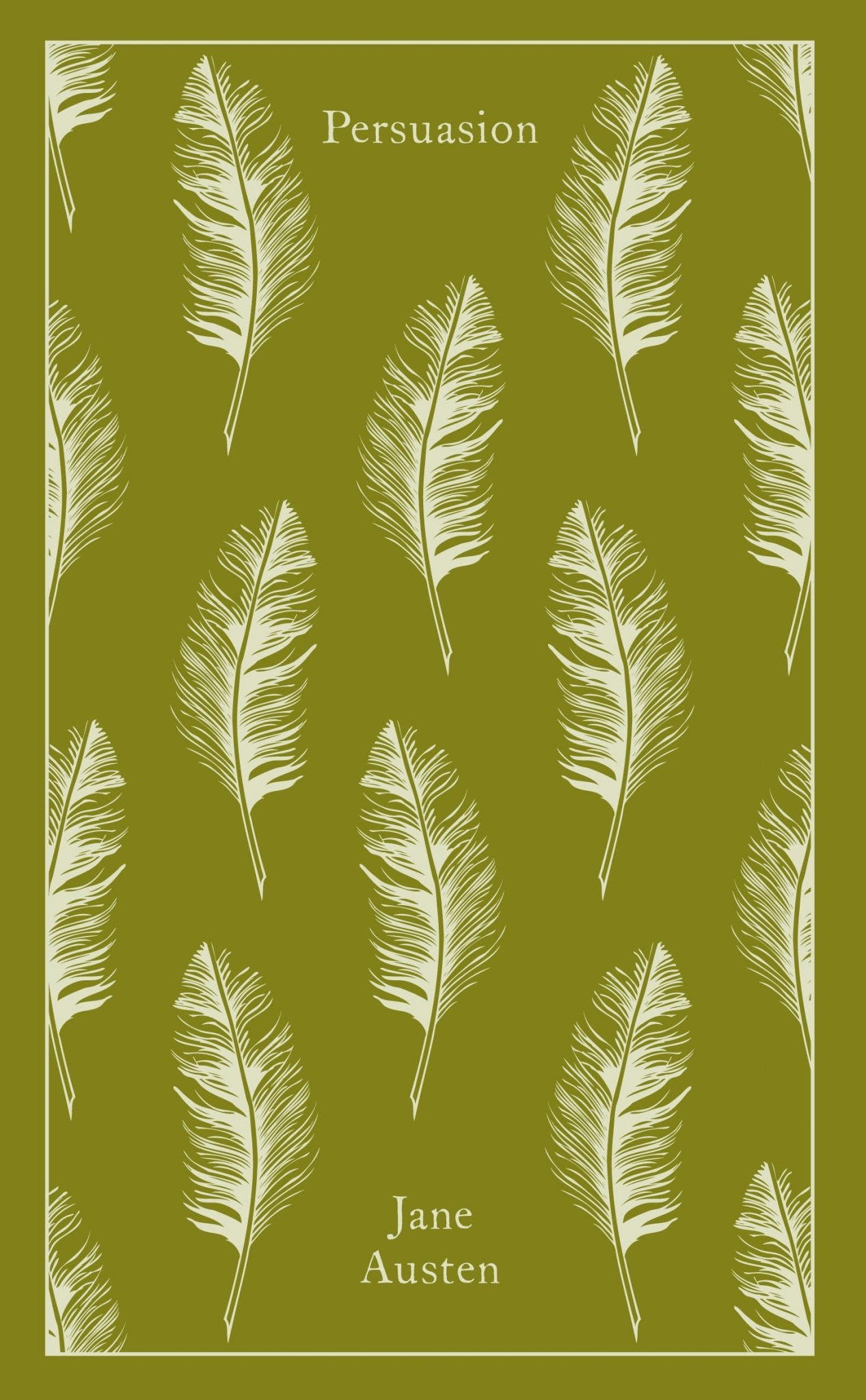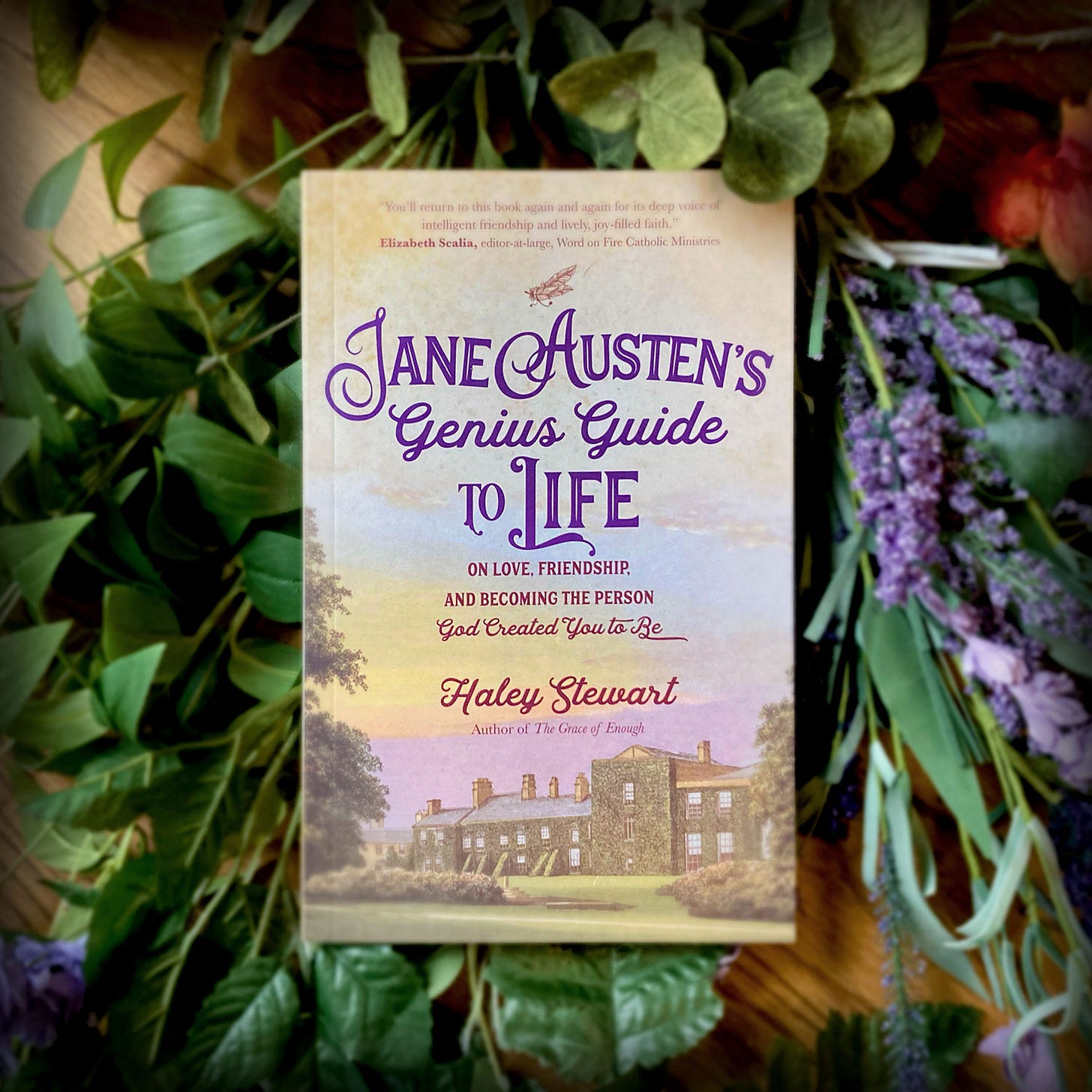If you’re new to this Substack, one of the things I’m offering subscribers in 2023 is A Year with Jane. We’re reading through Austen’s six novels this year and ending the year with a bang: Persuasion is our read for November/December.
This is a reader-supported publication. To receive new posts and support my work, consider becoming a free or paid subscriber.
Beginnings
If you’re looking for a level-headed take on Jane Austen’s Persuasion, you’ve come to the wrong place. This is perhaps my favorite of Austen’s novels and I think it’s practically perfect in every way. Prepare for gushing, delight, and praise for there is nothing to criticize.
From the very first page of Persuasion, we are confronted with Austen’s genius. In just a few paragraphs, we know so much about the characters. Austen introduces us to Sir Walter Elliot and in turn to the whole Elliot clan because Sir Walter is reading his favorite book: the Baronetage—a record of the most important British families including his own. His pompous vanity is almost funny—but instead it makes you wince. We do not laugh at him like we laugh at Mrs. Bennet. We cringe.
Just as in Pride & Prejudice, Sense & Sensibility, and Emma, there are no sons, only daughters. The youngest Elliot sister has been respectably married to Charles Musgrove who will inherit a nearby estate. The oldest, Elizabeth, is vain like her father—and because she is the most like him, most beloved by him. And the middle daughter? “…she was only Anne,” Austen tells us.
Only Anne
Anne is a stone’s throw from spinsterhood. She has deep regrets over an engagement she was persuaded to break off because her family and her mentor, Lady Russell, deemed the young man, Frederick Wentworth, ineligible. Neither of high rank or great fortune, his prospects as a young sailor were uncertain. Although very much in love, Anne let Lady Russell guide her decision and the young woman has regretted it ever since. She can only follow Wentworth’s career in the newspapers to discover whether he is still alive and safe during the Napoleonic wars. Not only did he survive, he has grown rich and successful (as he promised her he would) and is now a captain. Had she taken the gamble, it would have been well-rewarded.
While Anne’s decision to break off the engagement has lead only to her misery, she is not a foolish person who habitually makes bad decisions. In fact, Anne is nearly perfect. So perfect, in fact, that it’s hard to determine how Austen makes her “work.” Can a reader love a woman so wholly good? Two centuries of devotees will answer with a resounding yes. We fall in love with Anne and relate to her throughout the novel despite her overwhelming goodness.
C.S. Lewis points out (in a wonderful essay on Austen) that Anne is a successful heroine in a way that poor Fanny Price is not. It can be hard to love Fanny even if we know we should. Anne, on other other hand, is all of us. (And by that I don’t mean women who have experienced disappointments. I mean everyone.) Everyone has experienced being overlooked, forgotten, passed over, dismissed, unappreciated at some point. We know just how she feels. But it’s the kind of person she strives to be when she has every excuse to be bitter that inspires us and wins our love.
Discussion Question: In typical Austen fashion, the author gives us a character who is not easy to label or categorize: Lady Russell. We know her advice to break off the engagement has made Anne unhappy. But she’s often wise. How do you see Lady Russell offering good advice and thoughtful solutions/care for Anne in these first chapters? Are there also hints of her failures or lack of clear vision? Chime in by replying to this post!
Reading schedule:
Week of November 12th:
Gather your books and read Chapters 1-5 of Persuasion. There are many editions out there, so just grab what’s on your shelf or at the local library. And if you enjoy audiobooks, this is an excellent novel to enjoy with a great narrator. My favorite for this novel is Juliet Stevenson’s audiobook version. Grab Jane Austen’s Genius Guide to Life from Ave Maria Press (use STEWART20 for 20% off) or from Amazon.
If you didn’t start reading with us in January, you may want to catch up by reading the Introduction and Chapters 1-6 of Jane Austen’s Genius Guide to Life to set the stage.
November 19th-25th:
We’ll discuss Chapters 1-5.
Read Chapters 6-10 of Persuasion
November 26th-December 2nd:
We’ll discuss Chapters 6-10.
Read Chapters 11-15 of Persuasion
December 3rd-9th:
We’ll discuss Chapters 11-15.
Read Chapters 16-20 of Persuasion
December 10th-16th:
We’ll discuss Chapters 16-20.
Read Chapters 21-24 of Persuasion
December 17th-23rd:
We’ll discuss Chapters 21-24.
Read Chapter 7 of Jane Austen’s Genius Guide to Life
Caveat:
On the reading schedule I have suggested reading the chapter about Persuasion after finishing the novel. This is because as a reader I hate spoilers. But if you’ve already read the novel or are familiar with the story and want a resource to help you dive deeper as you re-read it, feel free to read Chapter 7 of Jane Austen’s Genius Guide to Life first.
I’ll be sending out weekly reflections and discussion questions to consider as you read. If you want to read faster or slower, go for it. This is fun, not homework.
If you know someone who would enjoy reading Austen with us for our Year of Jane, please share this post with him/her!
All Jane Austen book club emails and 2023 emails will continue to be available with a free subscription. But this is a reader supported effort. Consider supporting this literary Substack by upgrading to a paid subscription.
And if you know someone who would love this virtual book club, please share with them:
Looking forward to discussing Persuasion with you!
Haley
(Editor of Word on Fire Spark, Author, Former Podcaster)
Haley’s Children’s Mystery Series about Mouse Nuns
Haley’s Book on Jane Austen’s Novels
Haley’s Book about Radical Simplicity








I’d say that Lady Russell’s fault lies in what Austen willing offers up about her character-that she is blinded by titles. I think this plays into her discouraging Anne to marry Frederick Wentworth and also her timidity in first calling out Sir Elliot’s extravagant, above his means lifestyle as well as her willingness to so easily accept his refusal to acquiesce to her suggestions to economize. This might also be why she is not more forceful with Elizabeth, she bows to Sir Elliot given his high title and Elizabeth as follows since she is so similar to her father. It seems she is stuck in the frame of mind that those of higher rank call the shots. I wonder if she had been of any other rank-equal, above, very far below-if she would’ve so willingly supported Sir Walter in his distaste for Anne and Wenworth as a match? Or if this fault in her is engrained by a belief in the class system as a means of separating the importance of persons and their opinions. I’m sure further reading will illuminate her character in this regard more fully.
Yayyyy so excited for this one! Are you able to link to the CS Lewis essay or is it not available online?
As a fellow yenta and pathological busybody, I have every sympathy for Lady Russell. She loves Anne, she wants to protect her from her own youth and inexperience (and lack of a mother) and she thinks the best way to do that is to discourage her from marrying as an economic gamble. And I’m not sure she was wrong! Didn’t Fanny Price’s mother make the same bet (a nice man with neither birth nor fortune and uncertain prospects) and lose?
It’s easy in retrospect to say she was wrong because Frederick turned out to make his fortune and be respectable - but in the British navy during the napoleonic wars, a lot of that was luck and the kinds of strength/skills that would be impossible to evaluate at the beginning of a career. And it’s easy in these more meritocratic times to say marrying for economic security is overrated. But I’m not sure it is 🤷♀️